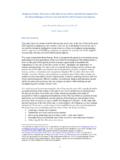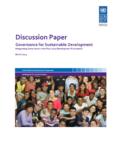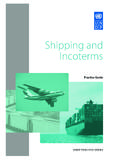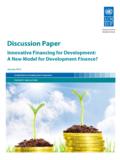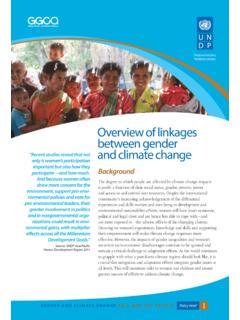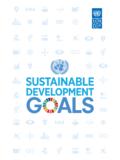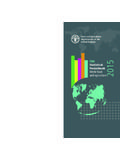Transcription of WP 2012-011: February 2012 Food Production and …
1 WP 2012-011: February 2012. food Production and consumption trends in Sub-Saharan Africa: Prospects for the Transformation of the Agricultural Sector Nicolas Depetris Chauvin, Francis Mulangu and Guido Porto 1. 1. Nicolas Depetris Chauvin, African Center for Economic Transformation, Francis Mulangu, African Center for Economic Transformation. Guido Porto, Universidad Nacional de La Plata. This paper is part of a series of recent research commissioned for the African Human Development Report. The authors include leading academics and practitioners from Africa and around the world, as well as UNDP. researchers. The findings, interpretations and conclusions are strictly those of the authors and do not necessarily represent the views of UNDP or United Nations Member States.
2 Moreover, the data may not be consistent with that presented in the African Human Development Report. Abstract: The objective of this paper is to contribute to the debate on the role of agriculture transformation in the development process and as an engine to reduce poverty and improve general wellbeing through better access to nutrients in Africa. To better inform the debate we review food Production , consumption and trade trends in a large sample of Sub-Saharan countries combining both macroeconomic and microeconomic evidence. We selected for the analysis nineteen countries for which household survey data was available, namely Benin, Burkina Faso, Burundi, Cameroon, Cote d'Ivoire, Ethiopia, Gambia, Ghana, Guinea Bissau, Kenya, Madagascar, Malawi, Mali, Nigeria, Rwanda, Senegal, South Africa, Tanzania and Uganda.
3 The data shows that dietary energy has been increasing in SSA but not steadily and not fast enough. The observed food Production and consumption trends highlight the importance of pursuing a deep transformation of the agricultural sector in Sub Sahara Africa if incomes are to be risen and food security problems are to be mitigated. Keywords: food Production ; food consumption ; agriculture; smallholders; Sub-Saharan Africa JEL Classification: O13; Q18; N57. 1. Introduction Sub-Saharan Africa is the poorest region in the world. Average real per capita income in 2010. was $688 (in constant 2000 US$) compared to $1717 in the rest of the developing world.
4 Over the past 30 years, GDP growth per capita in SSA has averaged percent per year. This failure of growth over the long term has resulted in high levels of poverty in the region. One finds the same picture of stagnation when one looks at the structures of African economies. In almost all of them Production is dominated by the primary sector in either agriculture or minerals. In the primary sector, agriculture is marked by low productivity with little application of science and technology, and in the mining sector almost all the operations using modern technology are foreign-owned enclaves with little linkages with the rest of the economies. Foreign trade mirrors the Production structure: exports are dominated by primary commodities incorporating little application of science and technology while the bulk of manufactures and knowledge-based services are imported.
5 For the majority of African countries, the agricultural sector still provides a relatively large share of GDP but productivity in the sector has lagged considerably behind that of other continents and the potential that Africa can reach in the sector. While on average agriculture employs 65 percent of Africa's labor force it accounts for about 32 percent of gross domestic product, reflecting the relatively low productivity in the sector. For Africa therefore, the rural population has been unable to move out of poverty principally because they have not been able to transform their basic economic activity which is agriculture. Because of the importance of the sector to the livelihoods of the poor, the World Bank said in its 2008 World Development Report, devoted to Agriculture and Rural Development, that the sector must be placed at the center of the development agenda if the Millennium Development Goals of halving extreme poverty and hunger by 2015 are to be met.
6 The literature is replete with examples of productivity-led agricultural transformation playing an active role in economic transformation in general and making agriculture an important driver of growth. Several studies have found that agriculture has been the engine of growth in most developing countries with causality running from agricultural growth to economy-wide growth in most cases, and that even small variations in agricultural productivity have had strong implications for the rate and pattern of economy-wide growth. Evidence from developed countries, the Green Revolution in Asia and Latin America strongly suggests that agriculture can be an engine of growth early in the development process and also an important force for poverty reduction.
7 While agricultural growth has been the precursor to the acceleration of industrial growth in a number of emerging economies such as China, Brazil, and India, for sub-Saharan Africa, current agricultural productivity is low and there have been numerous failures in getting agriculture moving. Over the past 10 years, Sub-Saharan Africa (SSA) has experienced encouraging economic growth averaging about per cent with some non-oil-exporting countries reaching an average of more than eight per cent. Despite this impressive economic performance, agricultural transformation has been slow and growth rather sluggish. Notably, productivity is still way below yield potentials, agricultural mechanization is weak and declining, and the state of the agribusiness industry is still nascent.
8 Although there have been pockets of success stories in a few countries, it is fair to say that economic growth did not spill over to the agricultural sector. Accordingly to some authors, it is imperative to promote agricultural 1. transformation on the ground that industrialization is dependent on agricultural improvement. If an industrial economy produces no food , its expansion will increase the demand for food , raise the price of food relative to industrial goods, and so reduce profits (Timmer, 1988). According to these authors, the record economic growth experienced by many SSA countries will be ephemeral unless it is accompanied by effective agricultural transformation.
9 On the other hand, other economists (see for instance Dercon and El Beyrouty, 2009) and analysts put less emphasis, if not in the development of the agriculture sector, in what they consider an excessive focus on food Production in SSA. According to them, there is an important wedge between food Production and food consumption that can be seen in the fact that many of the agricultural based countries fail to provide sufficient food and nutrition for their population. They criticize the main message of the World Development Report of 2008. that investing in agriculture is a necessary condition for any development. While the commodity price boom is an indication that further investment is needed in agriculture, this does necessarily imply that agriculture is the way forward for Africa.
10 Although it is true that in the aggregate the world cannot import food and increases in Production are badly needed, it is not necessarily true at the country level. Countries (particularly small ones) can import food without much effect on relative prices, and, according to these authors, historically food self- sufficiency and agricultural supremacy has never proved to be the defining feature of growth across the world. These competing views about the relevance of agriculture for growth and development imply different policy priorities for developing countries in general and for Africa in particular. However, this debate cannot be properly address without taking into account that Sub- Saharan Africa is a region with a multiplicity of realities.
